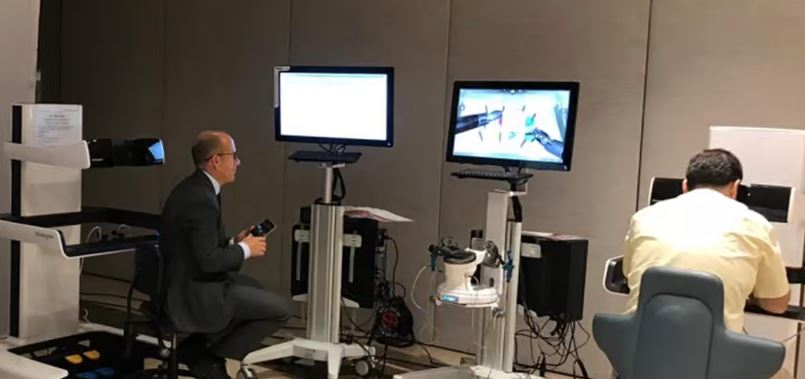Medical University of South Carolina Expands Secure, Curated Data Access Across 35 Teams with Informer
Customer Company Size
Large Corporate
Region
- America
Country
- United States
Product
- Informer
- Ellucian Colleague
Tech Stack
- CSV
- Excel
Implementation Scale
- Enterprise-wide Deployment
Impact Metrics
- Productivity Improvements
- Customer Satisfaction
- Digital Expertise
Technology Category
- Platform as a Service (PaaS) - Data Management Platforms
- Application Infrastructure & Middleware - Data Exchange & Integration
- Application Infrastructure & Middleware - Data Visualization
Applicable Industries
- Education
Applicable Functions
- Business Operation
- Quality Assurance
Services
- Software Design & Engineering Services
- System Integration
About The Customer
The Medical University of South Carolina (MUSC) is the oldest medical school in the southern United States, located in Charleston, South Carolina. It has more than 3,000 students and 800 residents and is comprised of six colleges: Dental Medicine, Graduate Studies, Health Professions, Medicine, Nursing, and Pharmacy. MUSC also includes medical and research centers, along with a public hospital. The university is dedicated to providing high-quality education and healthcare services. Stan Sulkowski, the Director of University Reporting, leads a team responsible for analyzing student data across all six colleges. The team handles complex data structures and frequent data requests, making efficient data management crucial for their operations.
The Challenge
The Medical University of South Carolina (MUSC) in Charleston, South Carolina is the oldest medical school in the southern United States with more than 3,000 students and 800 residents. The university is comprised of six colleges including Dental Medicine, Graduate Studies, Health Professions, Medicine, Nursing, and Pharmacy. The Medical University of South Carolina also includes medical and research centers, along with a public hospital. Stan Sulkowski is the Director of University Reporting and analyzes student data for all six colleges. With his technical background, Sulkowski and his team had access to and understood the complex data structures of Ellucian Colleague, such as which very similarly named computed columns or fields to use, but it is difficult to transmit that knowledge to coworkers. Student data requests could be bottlenecked as the team frequently fields several concurrent demands for data. Most data transformations had to be completed post hoc, with data moving from Colleague to CSV to Excel, where formulas and pivot tables would then finally be run. The university did not have a turn-key data filtering solution to supply end-users with only the information that was relevant to them. The Financial Aid team, for example, would have to manually comb through and collate data from multiple sources and years for some of their reporting, taking up valuable time. The university also had an inefficient system for recurring jobs that was especially cumbersome if run times needed to be changed.
The Solution
With Informer, Sulkowski and his team create reports for end-users so that they can easily answer a few inputs and receive the exact data they need without additional intervention. When needed, he uses post-query Flow Steps for data transformations, arithmetic calculations, to combine and compare data from multiple sources, time calculations for tasks such as time to degree or how long a student has been in a program, and to flag records based upon certain characteristics. Other options available as Flow Steps include the find-and-replace feature and the omit feature which allows users to eliminate unnecessary records from the final results based on additional post-query criteria. Informer Jobs, a widely used feature, provides automated workflows in scheduling and updating reports and Datasets. Jobs is being utilized by The Medical University of South Carolina and is particularly helpful for Jobs that need to be scheduled on custom intervals rather than just on a daily, weekly, or monthly basis. The school is using a new Dataset with a scheduled Job that uses email bursts to deliver Financial Aid counselors the information that targets their specific programs and colleges of responsibilities, so they only receive data they need. Jobs curate the data in a way that helps give end-users some relief from notification fatigue.
Operational Impact
Quantitative Benefit

Case Study missing?
Start adding your own!
Register with your work email and create a new case study profile for your business.
Related Case Studies.

Case Study
IoT platform Enables Safety Solutions for U.S. School Districts
Designed to alert drivers when schoolchildren are present, especially in low-visibility conditions, school-zone flasher signals are typically updated manually at each school. The switching is based on the school calendar and manually changed when an unexpected early dismissal occurs, as in the case of a weather-event altering the normal schedule. The process to reprogram the flashers requires a significant effort by school district personnel to implement due to the large number of warning flashers installed across an entire school district.

Case Study
Revolutionizing Medical Training in India: GSL Smart Lab and the LAP Mentor
The GSL SMART Lab, a collective effort of the GSL College of Medicine and the GSL College of Nursing and Health Science, was facing a challenge in providing superior training to healthcare professionals. As clinical medicine was becoming more focused on patient safety and quality of care, the need for medical simulation to bridge the educational gap between the classroom and the clinical environment was becoming increasingly apparent. Dr. Sandeep Ganni, the director of the GSL SMART Lab, envisioned a world-class surgical and medical training center where physicians and healthcare professionals could learn skills through simulation training. He was looking for different simulators for different specialties to provide both basic and advanced simulation training. For laparoscopic surgery, he was interested in a high fidelity simulator that could provide basic surgical and suturing skills training for international accreditation as well as specific hands-on training in complex laparoscopic procedures for practicing physicians in India.

Case Study
Implementing Robotic Surgery Training Simulator for Enhanced Surgical Proficiency
Fundacio Puigvert, a leading European medical center specializing in Urology, Nephrology, and Andrology, faced a significant challenge in training its surgical residents. The institution recognized the need for a more standardized and comprehensive training curriculum, particularly in the area of robotic surgery. The challenge was underscored by two independent studies showing that less than 5% of residents in Italian and German residency programs could perform major or complex procedures by the end of their residency. The institution sought to establish a virtual reality simulation lab that would include endourological, laparoscopic, and robotic platforms. However, they needed a simulator that could replicate both the hardware and software of the robotic Da Vinci console used in the operating room, without being connected to the actual physical console. They also required a system that could provide both basic and advanced simulation training, and a metrics system to assess the proficiency of the trainees before they performed surgical procedures in the operating theater.

Case Study
Edinburgh Napier University streamlines long-distance learning with Cisco WebEX
• Geographically dispersed campus made in-person meetings costly and inconvenient.• Distance-learning programs in Malaysia, India, and China required dependable, user-friendly online tools to maximize interaction in collaborative workspaces.• Virtual learning environment required a separate sign-in process, resulting in a significant administrative burden for IT staff and limited adoption of collaboration technology.

Case Study
8x increased productivity with VKS
Before VKS, a teacher would spend a lot of time showing a group of 22 students how to build a set of stairs within a semester of 120 hours. Along with not leaving the teacher much time to provide one-on-one support for each student to properly learn carpentry, it also left a considerable amount of room for error. Key information would be misinterpreted or lost as the class was taught in the typical show-and-tell way.

Case Study
Scalable IoT Empowering GreenFlex's Sustainable Growth
GreenFlex, a company that supports sustainable development, decarbonization, and energy efficiency, faced several challenges in its quest to expand its business. The company needed to deploy a robust and sustainable IoT technology to support its growth. It was crucial for them to monitor and control devices at customer sites in a safe and reliable manner. They also needed to integrate devices across a range of communication protocols and gather and act on data to meet efficiency targets. GreenFlex had previously built IoT capabilities into its digital platform, GreenFlexIQ, to monitor and manage customer sites remotely. However, they soon realized that they needed a new platform to support their ambitions. They needed a platform that could scale to connect more devices for production management and make it easier for the operations team to manage devices in the field.


